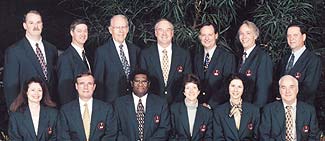North American Veterinary Conference sets attendance record

Record crowds turned out for the wet labs and companion animal, equine, food animal, and exotics- related seminars at the 17th annual North American Veterinary Conference, Jan 15-18 in Orlando, Fla.
Attendance of more than 13,500 people set a conference record. This included more than 5,000 veterinarians, 1,500 veterinary technicians, 350 practice managers, 600 students, 4,000 guests and 2,000 plus exhibitors. Registrants this year came from more than 50 countries.
Attendance for 1999 was 12,308.
"This was definitely our best conference ever," said Dr. Colin Burrows, conference program coordinator.
"Program variety is always a cornerstone of the NAVC, and this year didn't disappoint, with 39 web labs attended by more than 1,200 registrants," Dr. Burrows added. "We always feature state-of-the-art technology in our labs, including this year, for the first time, head-mounted video cameras that allow registrants to see even the most detailed procedures clearly."
Awards were presented to the 1999 North American Veterinary Conference speakers of the year. Selected by votes from 1999 registrants, the winners were Dr. Greg Ogilvie, Colorado State University College of Veterinary Medicine; Dr. Tom Divers, Cornell University, New York State College of Veterinary Medicine; Dr. David Pugh, Auburn University School of Veterinary Medicine; Dr. Deb Horwitz, practitioner from St. Louis; and Dr. Karen Rosenthal, University of Pennsylvania School of Veterinary Medicine.
The Opening Ceremony featured a presentation of the Mark L. Morris Lifetime Achievement Award to Dr. Kirk Gelatt of the University of Florida-Gainesville.
New officers include Dr. Betsy Sigmon, Raleigh, NC, president; Dr. Earl Rippie, Pennsauken, NJ, immediate past president; Dr. Charlotte Little, Port Washington, Wis, vice president; and Dr. Rick DeBowes, Manhattan, Kan, first vice president. The new board member is Dr. Don Harris, an avian practitioner from Miami.
Dr. Sigmon said the conference is especially noteworthy because it does not focus narrowly on one particular area of veterinary medicine. "Hopefully, people who attend come away with a better understanding of what's going on in their area, small animal, for instance, but also with an increased awareness of some of the issues or problems that might be facing other areas such as zoonotic or equine medicine," she said.
Next year's conference will take place Jan 13-17, 2001.